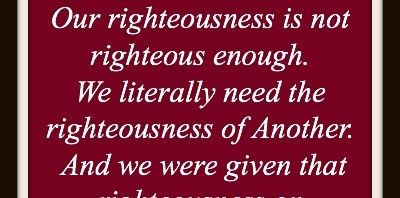We are in Passion Week, the week leading up to Easter. Last Sunday we commemorated the Triumphal Entry of Jesus Christ into Jerusalem (John 12:12-13) just five days before his execution, which would happen on a day we call Good Friday.

But why is it good? In truth, Good Friday was the darkest day that the world had ever seen, when the incarnate (i.e., in-the-flesh) Son of God became sin (2 Corinthians 5:21) – and was punished – for our sake, and the blackened sky reflected this tragedy (Matthew 27:45). So how is this a good thing?
Well, it all starts with a problem.
The Great Problem
For as long as men have been around, they’ve known that they’re spiritual creatures. We know in our hearts that there is an eternal aspect to our existence: the soul, the spirit, the part that does not die when our bodies do. And we know that we have been created, not that we are the result of generations of cosmic and biological happenstance. Any efforts to deny this are ultimately folly, since God has written this truth on our hearts. (See Romans 1:18-3:20 for an indictment of a race that “knows” God, whatever we may say.) We know it, but we often deny it, insisting that God doesn’t exist and that there is no objective standard for our behavior.

What’s more, these same men have always known that if there is life after death – and there is – then that is bad news for us, because we are – at best – imperfect. We’ve tried from early in our existence to pacify the gods. We’ve made gods like us, but better, more like we wish we could be. They’re eternal. Big. But they’re also angry, adulterous, murderous, and capricious. These gods (read: demons) demand things of us that reflect their hatred of us and their hatred of the One whose image we bear. In our errant worship, we destroy our souls.
Men’s sacrifices to the gods of this world and even the True God of Scripture as He commanded in the Old Testament testify to one common theme that God has written on our hearts: sin requires sacrifice. Sin is an infinite violation of God’s holy standard, and requires an infinite payment. This is where the situation gets still more dire: men are not capable of offering a payment for their sins that is sufficient to pay for their sins. A lifetime in hell paying for sins is not long enough to change a soul’s status from sinful to sinless. No time spent in hell can undo what’s been done. Our righteousness is not righteous enough. We literally need the righteousness of Another. And we were given that righteousness on Good Friday.
The Great Solution
At the cross on Good Friday, the God-Man Jesus Christ died a death for sinners. He paid a penalty that was sufficient to pay for the sins of all who would believe in Him. As a Man, He could pay for the sins of Man. As sinless God (without any sin of His own), He could pay for the sins of many men. He took our sins on Himself while we took His righteousness. It’s called the double transfer. Our sin was transferred to Him; His righteousness was transferred to us. He died with our sins, bearing the wrath of the Father.
But the story gets better.
The following Sunday morning – on Easter! – Jesus rose again from the grave! This is a cause for celebration for many reasons. For now, I’ll cite two:
- It signified that the work of paying for sins was complete. If Jesus were still in the grave, the the payment for our sins would still be in process, and we would have no hope or certainty that the wrath of God had been satisfied.
- Jesus conquered death. Death has no power over Jesus, and neither shall it have any power over His followers.
So we call it Good Friday, and rightly so. What appeared to be a defeat at the hands of sin and the devil turned out to be a glorious victory over sin, the devil and death. It is because of the work of Christ on Good Friday that we can be in relationship with the God of Scripture, that we can have any hope in the face of death. When Christians die, we go to heaven not because we have been good enough in this life, but because Christ has worked on our behalf, giving us His righteousness.
You may be wondering at this point if or how this righteousness of Christ applies to you. Well, let me encourage you with the following common Christian confessions:
- Jesus is Lord of all (Romans 10:9).
- God raised Him from the dead (Romans 10:9).
- Jesus is the only way to the Father (Acts 4:12).
- I am a sinner who needs to be saved from the consequences of my own sins and decisions. God alone can save me.
- Jesus’ payment for my sins on the cross is enough.
- I love God and want to know Him more and live in obedience to His commands.
If you also confess these things, then you can know – as certainly as God’s Word is true – that you may have a relationship with God forever as His adopted child.
May these truths give you plenty of reason to celebrate and declare God’s goodness this Easter and always. And if you have any questions about any of these points, please feel free to email us or leave a comment below.
